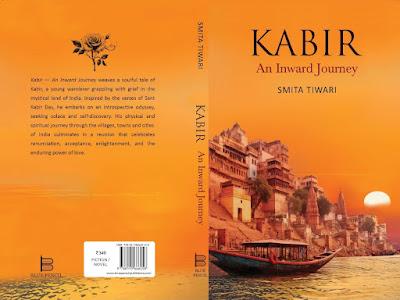
As the title suggests, the book centers around the character Kabir, seamlessly integrating the teachings of the great poet-saint Kabir Das into the storyline.
The narrative takes the form of a first-person account of Kabir's life events - twists and turns involving incidents, people, and places - revealing significant philosophical truths that are typically hidden from ordinary eyes.
Kabir's life serves as a wake-up call for individuals entangled in the pride and luxury of materialism on Earth. The narrative powerfully illustrates the impermanence of comfort and love throughout the plot.
Kabir - An Inward Journey is author Smita Tiwari's first book. As a debut author, her adept creation of characters and the flawless execution of the plot are truly commendable.
Storyline
Everything goes smoothly in the small, joyful family of young Kabir until unexpected events unfold, causing upheaval in each of their lives. The narrative unfolds as Kabir gradually transforms from a child burdened with heavy emotions of sadness to a young man in his late twenties, navigating life with newfound freedom and acceptance of its events.
Characterization, Narration & Plot
In the opening chapters, the novel provides a realistic portrayal of the lives of Indian middle-class households in the 1980s. The descriptions evoke a sense of nostalgia and may elicit a poignant longing for the simplicity that India once was.
The narrative unfolds at a brisk pace, offering succinct descriptions that allow readers to vividly visualize the scenes. The language is straightforward, avoiding unnecessary embellishments. The ease with which the author could connect readers with the lifestyles of both North and South India is noticeable. Also, the choice of placing the prime characters hailing from three different religions reflects the author's interest to bring in the unity of religions.
As the plot unfolds, readers find themselves intimately connected with Kabir's thoughts and emotions, a hallmark of a well-crafted novel that brings a character to life in the reader's imagination.
The scene when the old sac is opened almost brought tears to my eyes. My heart went out for such countless women in rural India who have silently endured and suppressed their emotions for the sake of their families.
Here's one of the narrations that I truly admired:
"There was a striking contrast in our feelings. It appeared as if Amma and I stood at the same junction of life where we parted three years earlier, but my pragmatic brother had traveled far. Perhaps that was why he was so confounded by our seemingly irrational behavior. I sensed his discomfort and so chose to conceal my emotions." (Page 41)
It captures an emotion in life that is challenging to articulate, where the origin of certain emotions cannot be easily identified. It goes beyond a mere play of words; it is undoubtedly an expression of a profound understanding of human dynamics.
Undoubtedly, the reader's anticipation of Kabir returning to Kashi to meet his family will linger in the latter part of the book. One aspect that I, as a reader, was expecting but went absent in the book is Kabir's reunion with his brother.
The Essence
A child lamenting the sufferings his mother endures, a husband struggling to meet the myriads of financial and emotional needs of the family, a son regretting the parting from his father as a youth, and through other characters in the book, the author underscores the significance of surrendering oneself to the Creator - not born out of hopelessness but rooted in trust and willingness.
Kabir's life elucidates the truth that the external struggles of human existence persist until one discovers inner solace in the perfect orchestration of life events and their essence by the divine. While there are moments in the plot where the reader may be drawn into Kabir's bereaved emotions, a brighter perspective emerges when the hindsight reveals a deeper understanding of it.
"Although phonetic, syntactic, and semantic structures support the linguistic utterances of a writer, there is another dimension to creative writing that is the most significant of all. It is this that transmits the intense feelings of a writer through their writings and resettles their soul in their literary masterpiece. It is neither the cover nor the content of the book that draws the reader into its world; it is its soul that communicates with the seeker and promises to fulfill his quest for knowledge." (page 82)
Well, through these words, the author summarizes in her own words the core of this book!
Kabir - An Inward Journey is the kind of book perfect for solitary, extended travels or when the mind is inclined towards contemplating life's philosophies. On a lighter note, the numerous pots of tea brewed by Kabir throughout are certain to offer refreshing moments for the reader along the way :)
Trigger warning: The storyline delves into deep melancholy, potentially stirring emotional turbulence for those who have recently experienced loss or are in a state of despair. Conversely, it may offer emotional comfort and awakening for individuals undergoing similar circumstances. Readers are advised to exercise discretion in choosing the book based on their current state of mind.
Reviewed for Blue Pencil Publishers
Disclosure of Material Connection: I received this book as a complimentary copy from the publishers in exchange for an honest review. I was not required to write a positive review. The opinions I have expressed are my own.
Title: Kabir - An Inward JourneyAuthor: Smita TiwariPublisher: Blue Pencil PublishersPages: 193
Buy Online
From the PublishersAmazon (Paperback)Flipkart
About the Book

KABIR – An Inward Journey invites you to delve into the heart of India through the eyes of Kabir, a young wanderer navigating the labyrinth of grief. In this sensitive and touching debut novel, Smita Tiwari intricately weaves a tapestry of emotions, spirituality, and self-discovery that will resonate with readers on a profound level.
Set against the backdrop of the mystical land of India, Kabir’s story unfolds like the verses of the renowned Sant Kabir Das. Wrestling with the weight of grief, Kabir is spurred into action, seeking solace and understanding on an introspective odyssey. His journey takes him through the vibrant tapestry of Indian villages, bustling towns, and bustling cities, each step a revelation leading to a deeper connection with the self.
As Kabir grapples with the complexities of life, his path ultimately converges with a celebration of renunciation, acceptance, enlightenment, and the enduring power of love. The pages of this novel are imbued with a profound sense of spirituality, encouraging readers to embark on their own inward journey of self-discovery.
About the Author
Smita Tiwari holds a bachelor's degree in Electronics and Communication Engineering. She worked as a Technical Evangelist in Infosys Limited.
Despite her background in science and a successful career, Smita had always been captivated by literature. She left her full-time job to embrace motherhood and found herself drawn back to writing in her leisure time.
When she lost her father to the pandemic, Smita's writing found a new purpose — she sublimated her grief in lyrical prose. Her debut work beautifully weaves the universal themes of love and loss and celebrates the enduring connections that define our lives.
